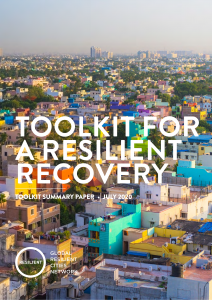Toolkit for a Resilient Recovery
by Resilient Cities Network | Download the full PDF of the toolkit here
OVERVIEW
Based on existing methods and best practices, the Resilient Cities Network and our Chief Resilience Officers are co-designing and identifying the best methodologies to enable cities to plan a resilient recovery. The Toolkit for a Resilient Recovery provides a reference framework to guide discussions in a phased manner. It comprises a suite of tools, based on best practices, which cities can use independently, as well as methods delivered in collaboration with RCN.
Our toolkit enables each city to define its own path to recovery by considering four iterative activities: assessing and analyzing the situation, defining a portfolio of actions, improving the proposals, and deepening learning.
Characterized by a place-based approach, the toolkit helps local governments to identify opportunities that include not only physical solutions – such as rethinking street layout to optimize pedestrian and cycling mobility – but also cultural practices, cross-cutting issues, and governance arrangements to achieve carbon neutrality in the long term.
Our ongoing collaborations to support cities in integrating resilience into their recovery efforts have four key phases: assess, plan, optimize, and learn.
Information in the Toolkit for a Resilient Recovery is for the use of city governments and local authorities globally.
This work is licensed under a Creative Commons Attribution-NonCommercial-ShareAlike 4.0 International License.
Learn more here: https://resilientcitiesnetwork.org/programs/toolkit-for-a-resilient-recovery/
